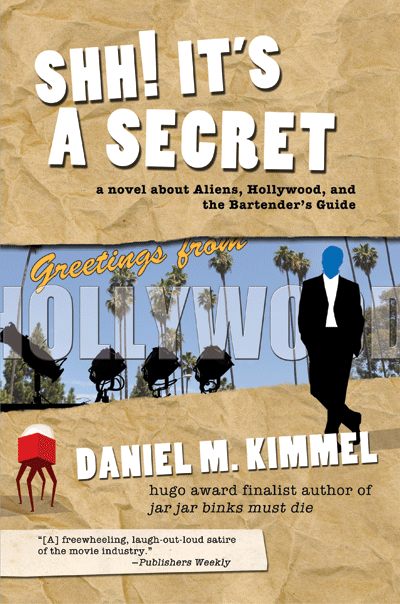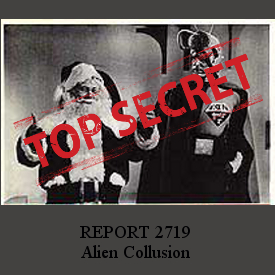Now that’s an interesting question. We’ve just launched my first novel, Shh! It’s a Secret: a novel about Aliens, Hollywood, and the Bartender’s Guide, at Arisia. It got written up in both Publisher’s Weekly and the Library Journal in their coverage of new science fiction releases. While I make no claim that it is “hard SF” — that is, based on knowledgeable and detailed extrapolation of real science — I would like to think my comedy about the first Hollywood movie starring an actual space alien is, indeed, science fiction.
However according to the current rules of the Science Fiction Writers of America it is not or, at the very least, it does not qualify. Now I’m not going to beat up SFWA of which I am a proud and happy affiliate member on the basis of Jar Jar Binks Must Die… and Other Observations about Science Fiction Movies. They are in the midst of a complex reorganization and cannot deal with other issues until it is completed. That’s fair and I have no complaint with that. I have been told they are aware of the issues I’m raising and will be dealing with them once their immediate legal situation is resolved.
 However I want to note that SF writers are supposed to be focused on the future and yet the current SFWA definitions of what qualifies one as a professional SF writer are mired in the past. I’m not pointing fingers. I’m trying to help define the issue.
However I want to note that SF writers are supposed to be focused on the future and yet the current SFWA definitions of what qualifies one as a professional SF writer are mired in the past. I’m not pointing fingers. I’m trying to help define the issue.
In terms of someone writing ABOUT science fiction, at least on film, there is no question that I have been doing so for some time. Besides my mainstream reviews I have written for Space and Time magazine, Clarkesworld, Strange Horizons, the Sci Fi Movie Page, the Drink Tank, and such late, lamented outlets as Artemis and the Internet Review of Science Fiction. Some of my blog posts are being repurposed by outlets like the southern SF magazine Bull Spec and the newly revived online edition of Amazing magazine. The fact that Jar Jar Binks Must Die… and Other Observations about Science Fiction Movies was nominated for a Hugo suggests that my seriousness as a commentator ON science fiction films is not in doubt and, certainly, it is what helped qualify me for SFWA affiliate membership.
Now, however, I have a novel out, but it is from Fantastic Books, a small press. One can easily order it on line from a variety of outlets, and it is being distributed by Ingram, one of the major national book wholesalers. Yet because it is small press and cannot pay out big advances, it does not qualify under current SFWA rules. SFWA will have to figure out a way to deal with the fact that the publishing industry has changed and that there is some brilliant stuff being released that doesn’t come from major publishers. (Case in point that won’t seem self-serving: Jennifer Pelland’s incredible first novel Machine.)
The field is changing. Instead of coming from a few major publishers like Tor and Baen — which continue to release major works by major authors — there’s also stuff coming from small presses, or coming in the form of graphic novels, or being released only in e-editions Generic pills online, artvigil, modvigil, waklert, modalert: modafinil online best price from 0.8$ per pill. Yes, it’s hard to keep up. Back in the era of First Fandom (in the 1930s and 1940s) it was theoretically possible to be on top of all the new SF that was out there. That hasn’t been the case in decades and it has only gotten more complicated.
I proudly wear the tag of “science fiction author” even if I’ve done it in a way that might have baffled Isaac Asimov (an author whom I revered). Publishing today and tomorrow has only a passing resemblance to publishing a generation or two ago. It will be ironic if it is the world of science fiction writers who have the most trouble keeping up.











That's DANIEL M. Kimmel.
I have read a number of Sci-Fi books on Amazon that are not available in hard copy form, so I assume they are self published. Some of them have been quite good, I guess they are also ineligible.
I found most of the Hugo award novels last year boring and long winded. Maybe changing eligibility woyld wake things up.
Once the internal issues are resolved I hope SWFA acts to keep up with the times.
The Hugo Awards have nothing to do with SFWA, and have completely different rules. SFWA's award is the Nebula.
Yes, it's complicated. SFWA for decades has seemingly concentrated on making it tough for people to join, an exclusivity that was only partly justified even when science fiction only came from big publishers. (I used to be a member, so I'm not saying that as somebody who couldn't get in.) Unlike the Romance Writers of America, they didn't want fans or wanna-bes or anybody who published a story in a fanzine to join.
Now, though, when it's easier than ever for someone to self-publish, they really have a dilemma. Do they just open the doors to the hordes, like RWA? How do they decide who's a real writer and who's not when anybody with a computer can get published on Kindle or Print on Demand? Either they have to give up and let anyone who wants to join in, like RWA, or they need to hold on to definitions that don't make sense in today's publishing world.
One big name author (who posted this on the SFWA site so I don't feel it's right for me to name names) said that a family member had published an e-book and had already earned much more than the minimum advance required under current SFWA rules, but would remain ineligible for membership. As I said, I'm not complaining. I'm trying to help define the issue.
Yeah, this stuff sure is confusing. Congratulations about the new book though, Daniel! That's great! I'm aiming to be a science fiction writer myself, and you're right, the old institutions seem to be getting steamrolled left and right by small time presses and electronic editions. It's as exciting as it is baffling. Who knows how things will be organized in a few years?
On the one hand, it's intimidating to see how much material is being produced. There's just no way one person could keep up with it. On the other, it's pretty cool that all you need to do to be a writer is have a word processor, internet access, and the ability to hit the "Publish" button. Of course, there's drawbacks to that as well. Nevertheless, cool post!